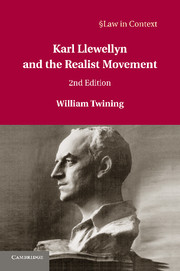Preface
Published online by Cambridge University Press: 05 December 2012
Summary
At first sight it may seem that few jurists can stake as strong a claim to singularity as Karl Llewellyn: the only American ever to have been awarded the Iron Cross; the most fertile and inventive legal scholar of his generation; legal theory's most colourful personality since Jeremy Bentham; the only common lawyer known to have collaborated successfully with an anthropologist on a major work; a rare example of a law-teacher poet; the chief architect of the most ambitious common law code of recent times; the most romantic of legal realists, the most down-to-earth of legal theorists; the most ardently evangelical of legal sceptics; the most unmethodical of methodologists ; and least controvertible of claims, the possessor of one of the most exotic prose styles in all legal literature.
Yet for all his idiosyncrasies, Llewellyn was to an extraordinary degree representative of the best of his generation of American law teachers. This is partly a function of the breadth of his interests. In studying him we inevitably have to learn something of subjects as varied as commercial law, civil liberties, appellate judging, advocacy, legislative drafting, legal education, the sociology of the legal profession, the philosophy of pragmatism, semantics, functional anthropology, the Sacco-Vanzetti Case, empirical research into legal processes, law reform, and, of course, the American realist movement. However, Llewellyn mirrored his environment for reasons that li? deeper than the fact that he had a broad perspective and a variety of interests.
Information
- Type
- Chapter
- Information
- Karl Llewellyn and the Realist Movement , pp. xxv - xxviiiPublisher: Cambridge University PressPrint publication year: 2012
